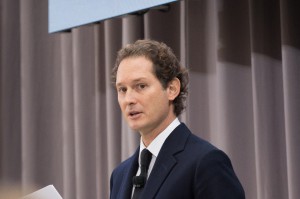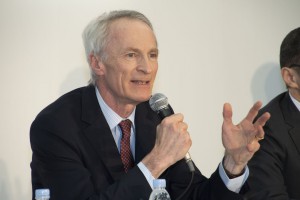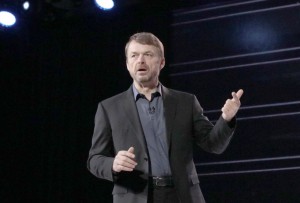
Fiat Chairman John Elkann's role in a merged company is part of what the two sides are trying to sort out.
During the coming months, Fiat Chrysler Automobiles and Groupe Renault will be putting an emphasis on due diligence, studying the potential pros and cons of the merger FCA formally proposed on Monday. Among other things, they’ll be looking at how their global operations would come together, everything from product lines to manufacturing operations.
But one of the biggest challenges, numerous sources both in and outside of the two companies stress, will be making sure that their corporate cultures are a comfortable fit. And that will begin at the top, with the management team of what would become the world’s third-largest automaker.
With the proposed deal expected to take anywhere from 12 to 18 months to finalize, many things could happen, including the choices for key management positions. But, at the moment, sources closely connected to FCA and Renault expect that Jean-Dominique Senard, currently the French automaker’s chairman, will become the new auto giant’s CEO. John Elkann, now FCA’s chairman, will retain that role in the new organization.
That shouldn’t come as much of a surprise considering that Elkann is the dominant heir of the Agnelli family, the founders of Fiat. Together, they hold 29% of FCA stock – but hold 44% of its voting rights. By comparison, the French government is Renault’s largest shareholder, at 15%, and holds outsized voting rights.
“The profit engine will be Fiat Chrysler – really Ram and Jeep,” said Joe Phillippi, head of AutoTrends Consulting, “and that likely will be weighed into the equation.”

Renault Chairman Jean Dominique Senard wasn't seen as the long-term holder fo the chairman's role at the Alliance.
(FCA lays out plan for “transformative merger” with Groups Renault. Click Here for the story.)
Both the Agnellis and the French government would see their stake halved after a deal were to be completed, barring any move to acquire or sell off shares. But together, they would still have dominant positions, and would likely press to ensure that both companies have reasonably even representation at upper management levels, according to various sources who spoke to TheDetroitBureau.com on background only.
One of the questions that does not yet appear to be locked down is where two other senior managers will wind up: Thierry Bollore, currently the Renault chief executive, and Mike Manley, who fills that same role at FCA. One of the options apparently being studied, according to several sources, would see them shift titles but essentially continue their roles, Bollore as president of the Renault side of the new company, Manley handling the operations Fiat Chrysler brings to the party.
Complicating matters, noted a senior source who has worked with both companies over the years, is that Senard is now 66. He was put into his current position only because Renault needed to shake up its top management team in the wake of the arrest of its former boss, Carlos Ghosn, in Tokyo last November on charges of financial corruption. But due to Senard’s age, prior to the announcement of the merger talks with FCA, he was not expected to stay on as Renault CEO for more than another year or so.
He is expected to remain a short-timer, said one source, perhaps planning to stay only until the merger is completed, or soon afterwards. So, picking a successor would likely be an issue that the two companies would have to cope with even before the last of the legal papers are signed.
(Click Here for more about the possible FCA-Renault merger.)
Who might step in were Senard to step down? For his part, Phillippi sees FCA’s current chief executive Manley as “the odds-on favorite,” but that doesn’t take into consideration the perilous issue of corporate cultures and national pride. The French government could press hard to keep one of their own nationals in that spot. Bollore would seem to be a logical first choice, but the question is how much support he could muster. His nomination to step in as CEO following Ghosn’s departure was controversial and saw one of Renault’s board members quit in protest.
There are other factors that could come into play as the FCA-Renault talks move forward: among them the French companies strained relations with the two Japanese carmakers that, with it, form the Renault-Nissan-Mitsubishi Alliance. Formed in 1999 when the French automaker committed a $6 billion bailout to rescue Nissan, it lays claim to being the second-largest automotive group in the world, sales of 10.76 million vehicles in 2018 just falling short of the Volkswagen Group’s 10.83 million.
“It’s regressing fast,” one Alliance source said, in the wake of the Ghosn arrest which many observers believe was orchestrated by Nissan CEO Hiroto Saikawa to help change the balance of the relationship between Nissan and Renault.
Numerous insiders that were willing to talk to TheDetroitBureau,com about the relationship said they believe all three companies want to see the Alliance continue, though Nissan recently fended off a merger proposal brought to it by Renault.
(Nissan shoots down Renault merger proposal. Click Here for the story.)
There is little doubt that an FCA-Renault merger would change the dynamics of the Alliance and could provide a fallback for the French company were the three-way partnership collapse. Were Renault to seriously want to hold things together, it would have to consider the strained situation in what it does over the next year, observers stress, including the final shape of the new management team.


Run Forest…RRRUUUUUNNNNNN